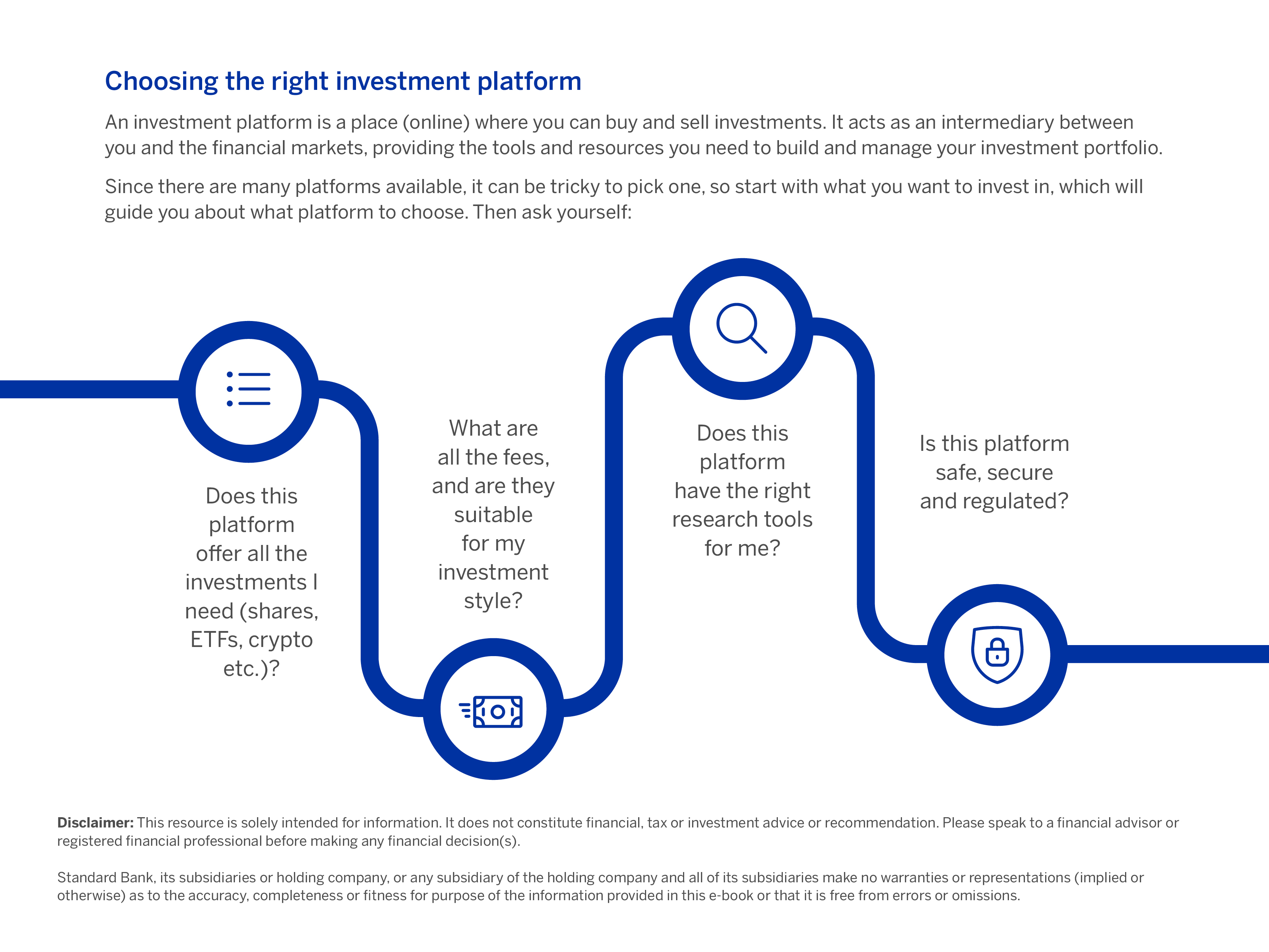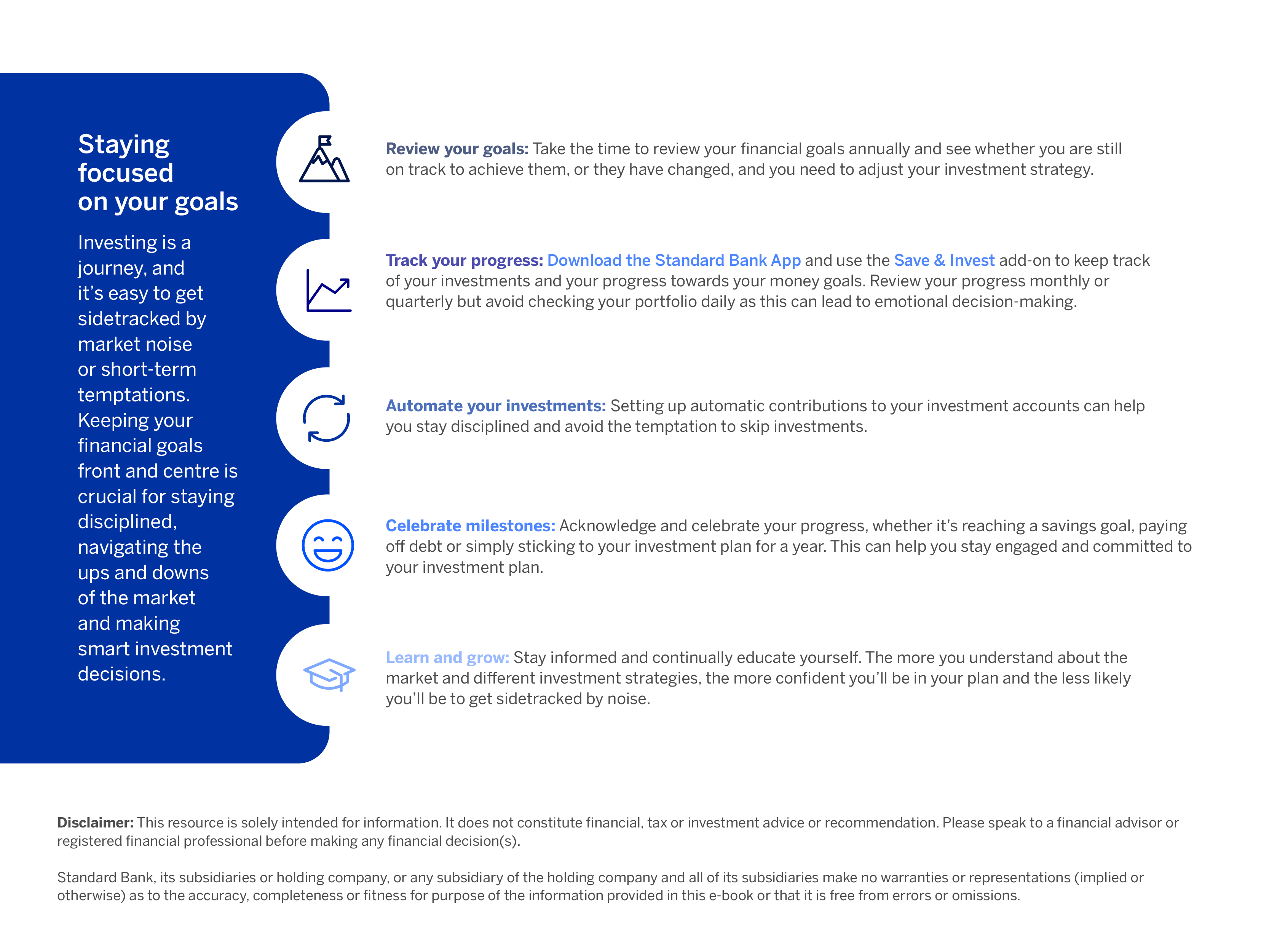
Investment online stock trading for beginners
Investing in the stock market can grow your wealth, and trading on the stock exchange has become simpler. Our guide to online stock trading will give beginners a helpful starting point.
Want to build a solid portfolio that allows you to succeed and avoid the stress and worry that can go along with market volatility? Here’s a simple step-by-step guide on how to start trading.
If you’re just starting out, one option is to build your portfolio through AutoShare Invest. This service allows you to start investing with a R500 monthly debit order, which Standard Bank uses to buy the shares you have chosen from its range of selected shares, including the JSE’s 100 top companies.
Our Online Share Trading experts advise new investors to consider five possible outcomes: a small gain, a large gain, breakeven, a small loss or a large loss. They also advise investors to avoid the type of big losses that can disrupt years of otherwise good investment returns. One way to do that is to use a stop-loss order. When a trade goes against you, a stop-loss order exits your trade if the price falls to a certain level.
While investing in shares for the long-term is a solid way to create wealth, there is no such thing as a safe investment. While there is potential for great reward, investing in the stock market also carries risk. As an online trader, your best bet is to structure your portfolio in a way that helps to reduce as much risk as possible. That’s where our Online Share Trading platform comes in. It offers simple registration, education, and expert advice.

Online Stock Trading for Beginners in 6 Steps
1. Open a trading account
Get started by registering for a Standard Bank Online Share Trading account in five simple steps:
- Sign up with your email address
- Enter your personal and banking details for fund transfers
- Add accounts and sign mandates for your portfolio
- Read terms and conditions
- Send in your identification documents
2. Define your own investment goals
Are your goals to ensure a comfortable retirement, help your children have a better future, save towards a new home or save for a long-overdue vacation? Regardless of your age, current financial status and aspirations, clarifying your ‘why’ will help you achieve your investment goal. Determining your timeframe is also crucial in your decision on what kind of shares to invest in.

3. Decide on how much money you have to invest
The amount you have available for an investment largely depends on your overall financial situation. It’s inadvisable to invest borrowed money as the interest you’ll be paying on the loan will most likely be high. Another financial error to avoid is investing before you have paid off all your short-term debt – the interest rate on debt is usually higher than the returns you’ll be receiving from your investment. By clearing up your debt (especially credit card debt), you will free up more of your cash for investing.
4. Educate yourself
Educating yourself is paramount. Before considering investing online, you need to learn more about how to invest or trade wisely on the JSE. There are many websites and online videos that simplify investment jargon and can help you make better decisions. Also, it’s advisable to avoid investing in anything you do not understand.
5. Define how you want to invest
It’s vital to make an upfront decision on how much you’re comfortable with losing. Investing is risky, particularly if you’re new to it. Your investment goals should align with your chosen method of investment.
- Income shares are a class of stock for investors typically looking for steady income in the form of dividends instead of capital gains. Investors that own income shares receive dividends from the entire fund's performance. An income share carries lower risk than a capital share.
- Growth shares can help you save for retirement from a young age when you can afford a slightly more aggressive portfolio. A growth share is a share in a company whose earnings are expected to grow at an above-average rate relative to the market, but stocks are chosen based on the potential for capital gains, not dividend income, so they can be risky.
- Blue-chip shares are stock options of large, well-established and financially sound companies that have operated for many years – these are a wise choice if you have started saving for retirement later in life as this investment ensures capital growth with lower risk. Remember, though that all investments carry risk.
6. Find a broker
Your first shares purchase will have to be administered through an order placed with a broker. In South Africa, as an individual client, you have a choice between a full-service broker and a discount broker. While a full-service broker is costlier, you receive professional advice and company research done by analysts.
Disclaimer: This article is for information purposes only and does not constitute financial, tax or investment advice. Readers are strongly encouraged to seek financial or legal advice before making any decisions based on the content.
Standard Bank, its subsidiaries or holding company, any subsidiary of the holding company and all of its subsidiaries, make no warranties or representations (implied or expressed) as to the accuracy, completeness, or suitability of the content of this article. The use of the article and any reliance on the content is at the reader’s risk.
Download our Investment strategies for beginners e-book and start investing with confidence.



